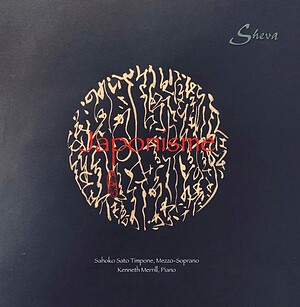' Songs of Japonisme' surveys musical 'East Meets West' expressions of the early 20th century
 |
| Cover art is nearly as enthralling as the music. |
Though the repertoire on this disc (Sheva Productions) might seem to occupy a small niche, there is an astonishing range of style and language (musical and verbal alike) over which Sahoko Sato Timpone and Kenneth Merrill show a ready command in "Songs of Japonisme."
After Japan opened to the West in the mid-19th century, there was plenty of mutual regard between Japanese and European/American cultures before the disruptions and hostility of World War II. Japanese poetry was often translated, and its visual arts effected a strong influence on modernism that extended to decor and fashion as well.
The mezzo-soprano and pianist recorded this imaginative collection of songs in 2018 at Purchase (N.Y.) College. The opening work includes the only other performer besides the duo recitalists: clarinetist Andy Biskin. Yoritsune Matsudaira's song "Asakusa Overture" reflects the degree to which there was some pre-war Japanese interest in new American music on the popular side of the spectrum. A good approximation of jazz is evident in this cabaret-like song. This kind of outreach is less characteristic of the disc as a whole, however, which embraces the art-song aesthetic.
The unforced lyricism of Kiyoshi Nobutoki's three songs adheres more closely to a desire to capture something essential about Japanese poetry and making sure the music reflects that. Two of the three are sad poems in which the vibrato Timpone produces is too pronounced, despite the evidence of her expressive engagement with the piece. Some of this manner of vocal production slightly mars the music elsewhere on the disc, yet my main impression is of a singer who seems at home in several languages and phrases sensitively across her range. She's responsive to styles as diverse as that of Bohuslav Martinu, the eminent Czech composer who's represented by seven song settings under the collective title "Nipponari."
In the Martinu set, some of the piano introductions and interludes have the kind of expressive breadth you can find in Schubert's songs. Such well-defined settings, capably colored and paced by Merrill, afford the singer richly suggestive backdrops. The agitation at a revelation of lost love in "A Look Back" is stunningly displayed. A comparable mood of recollection has the piano anticipating or echoing the vocal line in "A Memory"; it's an outstanding representation of the high quality of this partnership.
Also evocative is Joseph Marx's "Japanisches Regenlied," a hymnlike composition with a raindrop figure predominating in the accompaniment. A pointillistic accompaniment to a song by Francesco Santoliquido in "Petits Poemes Japponais" suits well a sketch of evanescence that contrasts snow with plum blossoms. There is little space allowed for sentimentalizing such poems. Both the Japanese and the European composers represented avoid such emotional underlining. The performers in this well-researched and -performed recital recognize such restraint, embodying it without being too stoic.
The two tracks concluding the disc run in a different direction. There are matters of explicitly disturbing quality in two contrasting treatments of an ancient Japanese story involving the vanity of love and a violent outcome; the performers offer straightforward depiction of the mortal costs involved.



Comments
Post a Comment